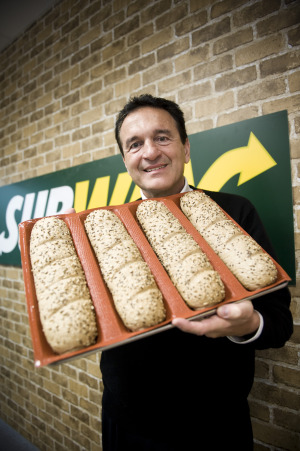 |
||||||||||||||
|
:: Home :: Nelson Davis :: Business Events, :: About |
||||||||||||||
Fred Deluca: His Story And The Subway Franchise's Mistake
Subway's Fred Deluca comes across as an unassuming sort—quiet, funny, humble, easy to talk to—not the kind of textbook corporate chief executive you'd expect to be leading the world's largest franchise operation. And Deluca's approach to business is equally as down-to-earth: For example, have a business idea? Then just get started on that business. "The key is get going, get going somehow. Don't wait forever until you take that next step," said Deluca, who founded Subway in 1965 and has grown it into a global powerhouse based in Milford, Connecticut, with nearly 39,000 stores—each of them owned and operated by a franchisee. Last week, Deluca shared his story of how he started Subway as a 17-year-old who'd secured a $1,000 investment with a small group of young entrepreneurs and a handful of journalists. Deluca, who rarely speaks to the press, did so because Subway is taking part in a campaign to educate young entrepreneurs in 100 countries about how franchise businesses operate. That effort is being spearheaded by Young & Successful Media, a Los Angeles-area organization founded by Jennifer Kushellthat bills itself as a social network for young entrepreneurs around the globe. After Deluca spoke to the small group gathered at the Hudson Hotel in Manhattan last Wednesday, I was curious to know why the now 65-year-old Subway leader was taking part in Kushnell's effort. Did he have a high-concept, big-picture goal of wanting to spread a message of U.S. business prowess around the world? "I'm not really an evangelist like that, thinking 'oh my God, I could save the world through American capitalism," Deluca told me. "I think that franchising is a big, big category of business and so for folks who are learning about business, no matter what country they're in, they should be exposed to it and they might get involved in some way." Deluca paused as a smile crept in, "I just hope no one that I teach anything to competes against Subway. I don't want them to start a sandwich shop. But they can do anything else." His own sandwich economy came around again when he talked about the goals for the program: "Jen's big goal, she wants to educate people about franchising, so I'm on board with that. For us, there's the short-term and the longer-term goal. On the longer term, some of the people are who are involved with the project, the might become franchisees or have a job within the company. In the very short term, they might buy more sandwiches. And both are good for me." Given the global nature of the franchise campaign, Deluca was asked during the small group session to talk about how Subway moved into international markets. "The real thing is how do you actually establish a beach head in a new country," he said. "It's hard as hell to even open a store in the next town where there are no customers so how do you go to a new country where there's no supply line, no customers, no employees, no franchisees, you don't know the laws, you just have to start over again." Deluca freely acknowledged that Subway messed up the first time it tried to expand globally because it tried a strategy of selling distribution rights to an entire country to a single individual, making them in effect a master franchisor who in turn would handle all other Subway restaurants in that country. "After a few years, I said to myself 'you know what? I'm going to stop this. I don't care if we never open another store internationally, but this does not work," he said, explaining that the problem was that the master franchisors were opening high-overhead offices, not high-earning stores. In our conversation after his talk, I asked Deluca if that was one of the biggest mistakes of his career and what he might do differently if he had a second shot at his business. Here again, Deluca impressed with his down-to-earth nature. "The people who won't make a mistake are the ones who don't do things. You don't do anything? You won't make a mistake. The minute you start doing stuff, some thing are going to go wrong. And the more you do, the more mistakes you make," Deluca said, before adding a "Butterfly Effect" twist when he said he wouldn't change his mistakes. "Sometimes, if you change what you do, you get a different result. Sometimes the different result can be fatal," he said. "Now, I don't know the problems I dodged along the way, but I ended up in a pretty good place. If I had to start over again on the journey, I might change one little thing and it could end up being a horrible state of affairs. So I wouldn't change a thing. All of the experiences are well worth it."
To share your business story confession, email it to: info@makingittv.com
|
||||||||||||||
![]()
![]()
 “After a few years, I said to myself 'you know what? I'm going to stop this. I don't care if we never open another store internationally, but this does not work...”
“After a few years, I said to myself 'you know what? I'm going to stop this. I don't care if we never open another store internationally, but this does not work...”